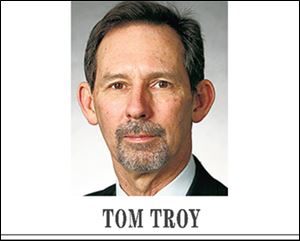
Issue 1 support a trap for Cordray
9/13/2018

Democratic candidate for governor Richard Cordray
ASSOCIATED PRESS
THE POLICY DIFFERENCES between Ohio’s two candidates for governor came into sharper focus this week, and not to the advantage of the Democratic nominee.
Republican nominee Mike DeWine unveiled his vehement opposition to Issue 1, the sole statewide question on the Nov. 6 ballot. If approved, Issue 1 would reduce many drug possession crimes to misdemeanors and eliminate the possibility of jail time until a third offense within two years.
In so doing, Mr. DeWine put himself on the side of most of the judges, prosecutors, sheriffs, and chiefs of police, and even the Ohio Bar Association, not usually a hotbed of conservatism.

Mr. DeWine timed his campaign announcement with the roll-out of a new ad, which, in keeping with his pattern of negative ads in this campaign, exaggerated the issue to the detriment of Richard Cordray, the Democratic nominee.
Mr. Cordray endorsed Issue 1 in July, in a joint appearance with Eric Holder, the former U.S. Attorney General.
A former attorney general of Ohio and former director of the U.S. Consumer Financial Protection Bureau, Mr. Cordray gave his “wholehearted” backing to the constitutional amendment at that time. Not a good move, it now appears.
In so doing, he may gain the more enthusiastic backing of progressive Ohioans and especially the all-important African-American vote. Issue 1 takes direct aim at “mass incarceration,” which refers to the disproportionate number of black men who are in prison or jail.
Mr. Cordray’s opponent back in the primary, Dennis Kucinich, had a black running mate, Akron councilman Tara Samples, and the primary was all about Mr. Cordray’s unusually pro-NRA position on guns.
But the primary was long over when Mr. Cordray committed this unforced error.
The issue is rapidly gaining opposition in the judicial community. Mr. Cordray’s support for Issue 1 is painting him into a corner of being soft on crime that will throw him on the defensive.
Mr. Cordray rightly sees the good side of Issue 1. It would reduce the amount of money that Ohioans divert into prisons every year, now about $1.8 billion. And it would save some people from a job and family-destroying felony conviction, leaving them with a misdemeanor conviction and no jail term.
In new television ads that were attacked by the Columbus Dispatch as outright false, the DeWine campaign claims “drug dealers” in possession of enough fentanyl to kill 10,000 people will be able to avoid jail.
Ohio Supreme Court Chief Justice Maureen O’Connor, taking a rare position on an election issue, said the measure would make it a misdemeanor to possess of up to 19 grams of the deadly painkiller fentanyl and predicts that drug dealers will figure out to distribute fentanyl in under-20-gram amounts so those caught possessing it would avoid incarceration.
That’s not what is supposed to happen if this measure passes because it is aimed at giving a break to people in possession with personal amounts of illegal drugs in their possession. However, it will take away a charge that police and prosecutors and judges use to win convictions against people engaged in low-level drug dealing.
Mr. Cordray says he supports Issue 1 because it would allow him to “work with law enforcement to make sure drug dealers are convicted and serve long prison sentences while people who need substance abuse treatment can get it in our communities.”
It’s also surprising that Mr. Cordray would support passage of a constitutional amendment relating to issues that are normally the purview of governors, legislators, and the state criminal code.
Their opposing stances on Issue 1 was one of two major policy differences to come into clearer focus this week. The second one is more in Mr. Cordray’s wheelhouse. It has to do with education.
Both candidates vowed to reduce the amount of testing that teachers would have to administer to students.
Cutting the issue of the Electronic Classroom of Tomorrow, Mr. Cordray vowed to abolish “charter school theft” — a clear reference to the ECOT scandal. ECOT was a wealth scheme engineered by Republican campaign contributor Bill Lager, who created an online school that friendly Republican lawmakers allowed to be set up to receive the same amount of per-pupil funding as was paid to brick-and-mortar schools.
Remember that students in ECOT typically spent an hour per day on the computer. In fairness, they probably spent additional time off-computer in educational activities, such as reading or visiting the zoo and the art museum. But let’s face it, they didn’t spend five hours a day, 180 days a year in a structured learning environment. ECOT’s relaxed education regimen was reflected in its graduation rate of about 40 percent.
ECOT was practically if not intentionally a sham, and through it our state government did a disservice to thousands of children and families.
Mr. DeWine accepted contributions from ECOT’s founder and main vendor, Mr. Lager.
In one of his negative TV ads, Mr. DeWine makes the claim that Mr. Cordray neglected 12,000 rape kits that were left sitting untested on police department shelves during Mr. Cordray’s two-year stint as attorney general.
The same reasoning should be aimed at Mr. DeWine, that as attorney general he neglected 12,000 ECOT students and only belatedly brought suit against “corrupt” practices by ECOT .
Tom Troy is an associate editor of The Blade. Contact him at: tomtroy@theblade.com or 419-724-6058.